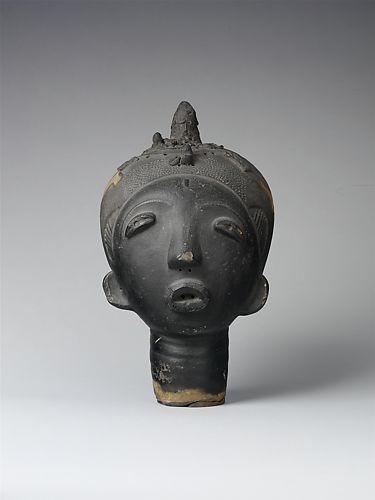Memorial Head : Since the late sixteenth century, Akan women potters have created ceramic heads and sometimes complete figures to commemorate deceased royals and individuals of high status.
During the funeral, family members placed the terracotta portraits of the deceased in a sacred grove near the cemetery, sometimes with representations of other family members. These sculptures (Memorial Head) served as the focal point for funerary rites in which libations and food were offered to the ancestors.
This example has a rounded face with protruding elliptical eyes that tilt downward and a delicately shaped nose.
These circular shapes are repeated by the eyebrows, ears, and open, oval-shaped mouth which projects from the smooth surface of the face. An incised line curves around the forehead, indicating the hairline.
The surface of the sculpture has been covered with a clay slip tinted black, a color linked to the ancestral world and spiritual power in Akan thought. Like other examples of African portraiture, these commemorative sculptures are idealized representations that convey individuality through specifics of scarification and hairstyle.
The artist would typically be summoned to the deathbed of the deceased to observe his or her distinguishing characteristics, which she would depict later, working from memory to capture the individual’s essence. The figural terracotta sculptures vary enormously in style, ranging from fairly naturalistic and sculpturally rounded forms to examples that are solid, flat, and more dramatically stylized.


